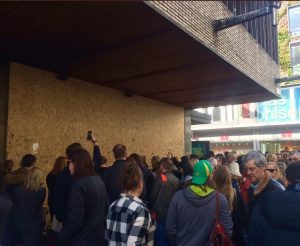Rahmat Akilov’s Trial Raises Important Dilemmas for Swedish Policy Makers
The trial of Rahmat Akilov, the lone wolf terrorist who killed five pedestrians in Stockholm’s equivalent of Oxford Street, last April have just begun. Whilst the trial is expected to continue for several months, it will no doubt raise important questions pertaining to Islamic extremism, terrorism and fundamentalism in Swedish society. Those debates similar to the UK are not new and has continued with various degrees of intensity over the past years. However with this year being election year, they are sure to be one of the major topics of political debate in the country. It is likely that the Swedish Far-Right will look to exploit these fissures within Swedish society.

But what is often overlooked is the grassroots work by Muslim communities in Sweden. They can often be more effective than government strategies, and some actors, albeit controversial, are successfully working to counter extremism in their communities. One such community is the quietist Salafis of Sweden who are very active in countering extremism in Swedish society. Now, I use the term quietist loosely and for ease, but quietist Salafis are also known as Madakhila or Madkhalis, named after its founder Sheikh Rabee’ al-Madkhali a controversial scholar from Saudi Arabia. To his detractors he is seen as a government loyalist, to his defenders one of the most influential scholars of his age. In the UK the Madakhila have been accused of shopping in their coreligionists to the authorities for opposing the Kingdom of Saudi Arabia, but in Sweden they do not have that reputation. In fact, some of the Madakhila there are becoming increasingly independent of Saudi politics and prefer to keep a respectful distance from the KSA whilst others have become increasingly critical of the kingdom. Some observers have also pointed out that it is incorrect to suggest that Madakhila do not get involved in politics, in Libya for example, some of them have even formed armed units and are actively involved in shaping the country’s future. Of course, the Libyan example is not endorsed by many Madakhila outside of Libya and indeed within, one should add. Madkhalism then, should not be treated as a monolithic whole but understood in all its varied manifestations.

But things are complicated and cannot be viewed in isolation. With geopolitical and ideological struggles raging throughout the Muslim world, they are inevitably reflected in the Muslim communities across the European continent, Sweden being no exception. According to Säpo, the Swedish security services, more than 300 young Swedish citizens have traveled to fight in the MENA region as foreign fighters, with their ideas spreading among those who have stayed behind. According to a recent evaluation by Säpo, there are likely to be ‘thousands’ of possibly violent Islamists in Sweden as stated by the former Säpo director Anders Thornberg, and countering the ideology driving it is at the forefront of everyone’s’ mind. Hundreds of suggestions and models have been put forth, considered, rejected or reviewed, from harsher punishments to criminalization of certain beliefs, but none seem effective enough. What leads to extremism? Is it only about foreign ideologies? What’s going on among the grassroots communities? Is the message for violence confronted enough?
According to a senior graduate of the Islamic University of Medina, Saudi Arabia, Abdellatif (name changed to protect his identity) told this author that religion often gives meaning to an otherwise rather hopeless existence. “It might be the only sacred [thing] left in their lives, Islam and the family”, he said. “The rest you can perhaps compromise with, but not those two things.” According to this Imam he performed a pastoral role in Rinkeby and the surrounding Suburbs, and believed that they have an important influence within the Muslim diaspora communities in Sweden, “we are regularly contacted to solve family problems”, he said “to resolve disputes, also young people involved in criminality seeking guidance will turn to us, they want to know how to escape that life, how to resolve old conflicts and so on, so we definitely play an important role,”
The quietest Salafis of Sweden have adopted an overall integrationist and pragmatic approach to their host society, where they instruct their followers to be good citizens, live honest lives, work and pay taxes, but to avoid compromise in matters of religion. When I asked a Salafi leader what differentiates his group from others labelled Salafi by Swedish observers, he is very adamant to point out that their group publicly distance themselves from violence, while others called ‘Salafi’ by the observers might not, and that they also distance themselves from all illegal activity and condemn such things as economical and welfare fraud, which other groups labeled as ‘Salafi’ have been alleged to be involved in. The Salafi-Jihadis, on the other hand, exhort their followers to separate themselves from mainstream society on the grounds that it is ‘dar-ul harb’, ‘territory of war’- a term used by Medieval Muslim jurists to denote zones of conflict. They condemn the host society and fuel polarization, marginalization and promote the growth of radical and violent ideas.
“We have previously focused mainly on Stockholm with good results”, he began. “Lately besides that we have aimed our efforts more towards other problematic cities. In those places significant progress have been made against leading figures in those groups, and against other ISIS sympathizers that have subsequently dropped those ideas as a result. Can’t tell you more, it’s confidential.”Q-What do you talk about?A: “Theological arguments, refuting their arguments for terrorism and proving it’s [Islamically] forbidden, proving that it’s forbidden to join terrorist organizations or groups, rulership and revolts in the Muslim world. They can be very emotional, and sometimes you have to meet them on the same terms.”Q: How many do you think have been prevented from traveling to Syria or have left violent ideology through you?A: “Hard to tell, but many.”More than a hundred?A: “Possibly.”Q: How do you reach out to them, or even find them?A: “Discussions and similar. They have often approached us, wanting to debate. Contacted us on social media and sometimes showed up in person after our lectures. Also people who bring their old friends from those groups to us. Some were proper ISIS-types.”Q: What do you talk with them about, how do you talk to them, what subjects are brought up and how do they argue?A: “We usually try to have a pedagogical approach to people. Firstly, we want people to start questioning these ideologies that they are following and those persons that they follow, to cite examples that those they follow lack proper Islamic knowledge, that they are unknown, what Islam says about following unknown people, we’ve also brought up historical examples of the Khawarij and what their signs are, and compared them to the groups of today, quotes from ISIS-leaders that is similar to historical quotes from the Khawarij, scholarly arguments against terrorist attacks and to perform terror attacks, that just because injustices and killings is carried out against Muslims elsewhere it doesn’t justify similar actions being carried out against non-Muslims here, there is a lot of focus around this topic by them and a lot around the idea of revenge that they believe they are entitled to, and we work to remove those ideas that you can do that against people, and that this has nothing to do with Jihad and so on -All of this is done in obscurity, almost every day”
“Extremism” he said, “isn’t so much about radical ideology as it is about being young and angry. A shallow understanding of Islam combined with youthful enthusiasm, anger or the drive to ‘go out and change the world’ amounts to a lot of extremism within the community. The problem that arises, and here we enter the picture, is, what do you want? [Do] you want to go to Heaven and do good. How do you achieve that? All these people, that fall into this [extremism], they want to do good, but either they don’t know what it is or don’t know how to do it. When they don’t have this what or how together, then you will have a problem.”
“You need to fight them [extremists] in the right way, or you’ll just play right into their hands…if they are determined to carry it out, no one can really stop them. If they can get all they need to put some bomb together from Bauhaus, they’ll do it. What this is all about is not if the police can prevent it or not, but about the factor behind, the ideology. If you counter that, at least half the work is done.”
“A Turkish offensive in north-west Syria against US-backed Kurdish militias that successfully fought ISIS is adding to the tension. “ISIS is far from finished — and there is probably a willingness on many sides to leave its remainder alone so it can attack their enemies for them,” one Syrian opposition figure said. An al-Qaeda splinter group, ISIS was long tolerated by opposing sides in Syria’s seven year conflict in the hope its attacks would weaken rivals.”
This post was written by Gibril Fodor, a Swedish freelance writer, with additional reporting from @tamhussein
